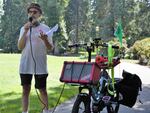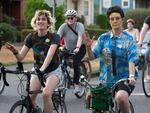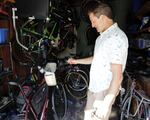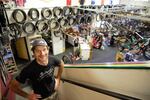
Steve Cheseborough organized a ‘Pickle Palooza’ bike ride to celebrate two of his favorite activities, bicycling and pickling, "Rather than accept a corporation’s pickle, make your own. Rather than accept a corporate way of getting around by buying oil and cars and insurance, just get a bicycle."
Kristian Foden-Vencil / OPB
On a muggy afternoon in Portland’s Laurelhurst Park, musician and pickle enthusiast Steve Chesborough stands under a shady tree looking for cyclists. He’s nervous because he’s organized a ‘Picklepalooza’ bike ride under the Portland Pedalpalooza cycling program — and so far nobody’s turned up.
“Are you here for the pickling ride?” he asks two cyclists, who nod. “Oh good. This is it!”
As people show up he relaxes and explains that for him, bicycling and pickling are inextricably linked, “Rather than accept a corporation’s pickle, make your own. Rather than accept a corporate way of getting around by buying oil and cars and insurance, just get a bicycle.”
He’s not alone in his beliefs. More than a dozen people turn up for his ride, where they’ll have a pickle picnic and drop in on a couple of pickling businesses. The belabored point is that nowadays, people are jumping on their bikes for any reason. Over the last week, thousands have climbed onto the saddle to do everything from celebrating Star Trek, to crossing bridges and getting naked.

A biker dressed as Commander Data from Star Trek Next Generation holds up the Vulcan hand signal for "Live long and prosper," at Pedalpalooza's Star Trek ride in Southeast Portland, Tuesday, August 5.
Hanin Najjar / OPB
Jonathan Maus the editor of Bike Portland said COVID-19 had everybody dusting off their bikes, “Here’s this thing we can use that can be safely distanced from other people, be a healthy outlet... So all the things that we know that bicycling is so great for, were actually tailor-made for the COVID era.”
At the height of the pandemic, the streets were so full of bikes, the city had to do something. It launched a ‘Slow Streets’ program and put plastic bollards and signs across 100 miles of streets to make them bike and pedestrian-friendly.
“They actually have come back now and fortified those additionally and made them more permanent,” Maus said.
An actual count of the number of bike riders is elusive. Traffic engineers tend to measure car movements, and the pandemic completely changed car and bike commuting. But Maus believes people who’ve embraced bikes during the pandemic, will stay in the saddle.
“Anytime the city does something to dramatically improve streets for people and limit car access...it’s hard to take them back because, guess what, people love having a healthier quieter, more humane way to get around,” Maus said.
The Oregon Department of Transportation just announced $55 million for pedestrian and bike improvements. President Joe Biden’s infrastructure bill also contains some big numbers for cycling.
But while Maus welcomes new money, he doesn’t think it’s enough to fundamentally change transportation habits.
“I think to move the needle in America and regional and locally, you can’t continue this incremental progress of ‘Hey we’re doing a lot of great stuff for bikes.’ If you’re also doing all the same status quo for driving. Because the two are mutually exclusive, to a large degree,” he said. “That’s what I think a lot of local politicians and community leaders haven’t fully understood or haven’t been willing to change.”

The editor of Bike Portland, Jonathan Maus, said that since COVID-19 hit, it seems everybody dusted-off their bikes, “I think to move the needle in America and regional and locally, you can’t continue this incremental progress of ‘Hey we’re doing a lot of great stuff for bikes.’ If you’re also doing all the same status quo for driving. Because the two are mutually exclusive, to a large degree. And that’s what I think a lot of local politicians and community leaders haven’t fully understood or haven’t been willing to change.”
Kristian Foden-Vencil / OPB
Maus wants dedicated bike corridors so cyclists can get from A to B without having to negotiate a busy highway or dangerous intersection.
Dylan Rivera with the Portland Transportation Department they’ve built 14 miles of protected bike lanes completely separate from cars, and have another 10 miles in the works. The rest of the city’s bike network he said, is safe.
“We’ve built hundreds of miles of bikeways and we find people need help and inspiration to use those,” Rivera said.
That means organizing things like scavenger hunts so bikers can get comfortable with new bike routes.
At Sellwood Cycle Repair in Southeast Portland, owner Erik Tonkin agrees there’s been a bike boom during the pandemic. He couldn’t keep enough inventory on the shelves, and repairs went through the roof. But he’s not sure it’ll be sustained when the pandemic ends.
“I don’t think that we can expect the demand to quite last,” he said.
Tonkin thinks that while some people will remain in the saddle, others will revert to activities they enjoyed before the pandemic.
Still, one unknown remains — e-bikes. They too saw dramatic sales, and they cost $3,000 or more. So the question is this: When someone spends that much money, will they stick with their new bike long-term, or just park it in the garage again when the pandemic ends?

The owner of Sellwood Cycle Repair, Erik Tonkin, isn't sure the boom in bike ridership will continue after the pandemic, “I don’t think that we can expect the demand to quite last.”
Kristian Foden-Vencil / OPB
